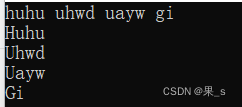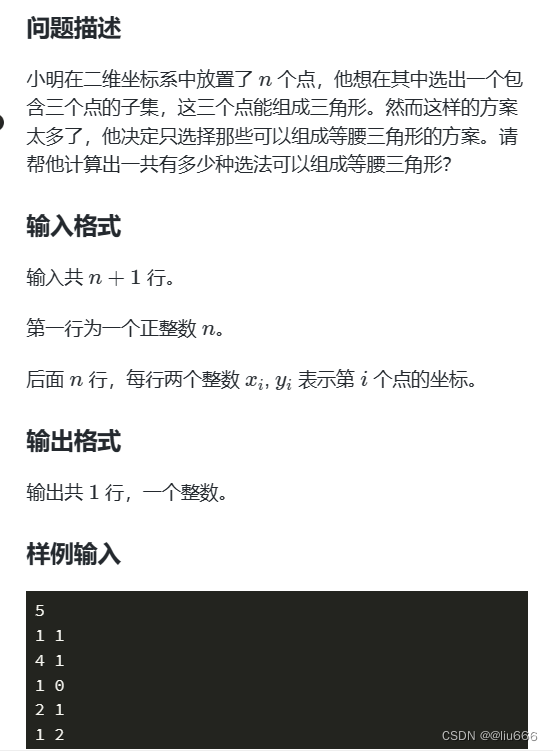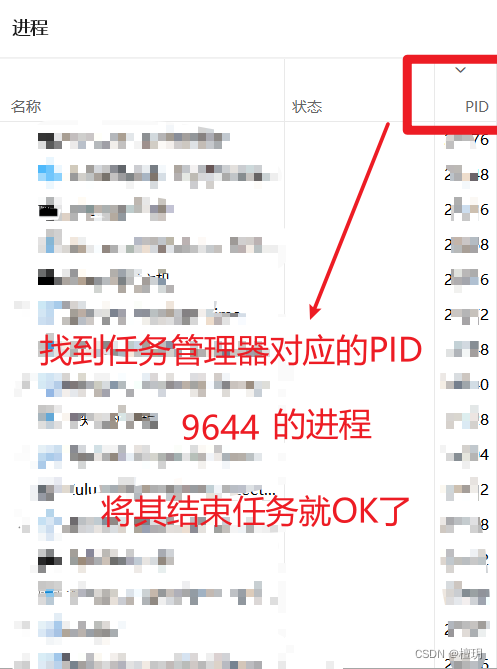字符移动问题
这道题的描述是这样的:输入一个字符串,将其中的数字字符移动到非数字字符之后,并保持数字字符和非数字字符输入时的顺序。例如:输入字符串“ab4f35gr#a6”,输出为“abfgr#a4356”。
以下使我试着敲的代码,思路很简单,遍历两遍字符串,第一遍把非数字的排好,第二遍再把数字排好。
#include <stdio.h>
#include <string.h>
#include <stdlib.h>int main() {char str[100];char temp[100];gets(str);int len=strlen(str);int i=0,q=0;while(q<len){if(str[q]>'9'&&str[q]<'0'){temp[i++]=str[q];}q++;}q=0;while(q<len){if(str[q]<='9'&&str[q]>='0')temp[i++]=str[q];q++;}puts(temp);return 0;}
但是这段代码运行结果并不令我满意:

查询发现我犯了一个严重错误:
字符范围判断错误:条件str[q] > '9' && str[q] < '0'是逻辑上不可能的,因为在ASCII码中,'0'到'9'之间没有其他字符,因此这个条件永远不会为真。这意味着第一个while循环实际上不会把任何字符放进temp
因此作出修改:
#include <stdio.h>
#include <string.h>
#include <stdlib.h>int main() {char str[100];char temp[100];gets(str);int len=strlen(str);int i=0,q=0;while(q<len){if(str[q]>'9'||str[q]<'0'){temp[i++]=str[q];}q++;}q=0;while(q<len){if(str[q]<='9'&&str[q]>='0')temp[i++]=str[q];q++;}for(i=0;i<len;i++){printf("%c",temp[i]);}printf("\n");return 0;}
这样就可以了。同时做出的更改还有将输出字符串从puts()函数改成了printf()函数,原因是就算结果是正确的,我所输出的结果后还跟着一长串‘烫’字,不知道什么原因。。。
查询得到有可能是因为:
初始化与结尾处理:由于字符数组temp没有被明确地终止,因此在输出时可能包含未初始化的字符,导致出现乱码。
尝试改回去,在temp数组末尾加‘\0’。
#include <stdio.h>
#include <string.h>
#include <stdlib.h>int main() {char str[100];char temp[100];gets(str);int len=strlen(str);int i=0,q=0;while(q<len){if(str[q]>'9'||str[q]<'0'){temp[i++]=str[q];}q++;}q=0;while(q<len){if(str[q]<='9'&&str[q]>='0')temp[i++]=str[q];q++;}temp[i]='\0';puts(temp);return 0;}
这样也是正确的。
字母统计问题
题目描述:输入一行字符串,计算其中A-Z大写字母出现的次数
#include <stdio.h>
#include <string.h>
#include <stdlib.h>int main() {char str[100];int len;int i;char c;while(scanf("%s",str)!=EOF){len=strlen(str);int count[26]={0};for(i=0;i<len;i++){if(str[i]>='A'&&str[i]<='Z')count[str[i]-'A']++;}for(i=0,c='A';c<='Z';c++){printf("%c:%d\n",c,count[i++]);}}return 0;}
首字母大写问题
题目描述:对一个字符串中的所有单词,如果单词的首字母不是大写字母,则把单词的首字母变成大写字母。 在字符串中,单词之间通过空白符分隔,空白符包括:空格(' ')、制表符('\t')、回车符('\r')、换行符('\n')。
真的会被字符串的题的细节坑到。。。
上代码:
#include <stdio.h>
#include <string.h>
#include <stdlib.h>int main() {char str[100];int len;int i;char c;while(scanf("%s",str)!=EOF){len=strlen(str);c=' ';for(i=0;i<len;i++){if(c==' '||c=='\t'||c=='\n'||c=='\r'){if(str[i]<='z'&&str[i]>='a'){str[i]=str[i]-'a'+'A';}}c=str[i];}puts(str);/*for(i=0;i<len;i++){printf("%c",str[i]);}printf("\n");*/}return 0;
}
给看一下这段代码的运行结果:

是的,它把每一个空格隔开的字符串当成完全独立的字符串了o(╥﹏╥)o
搜索得知:
在C语言中,使用fgets函数可以安全地读取带有空格的字符串,并且你可以指定一个最大的字符数来防止缓冲区溢出。此外,可以检查字符串中是否包含换行符来确定用户是否按下了回车键。
char *fgets(char *str, int n, FILE *stream);fgets 是 C 语言中用于从指定的输入流读取字符串的函数。常用来读取标准输入 (stdin) 或从文件读取数据。
这里解释一下每个参数的含义:
-
str:指向一个字符数组的指针,这个数组用于存储从输入流读取的字符串。这个数组应该足够大,以存储读取到的字符串以及字符串终止符\0。 -
n:要读取的最大字符数(包括字符串终止符\0)。fgets最多会读取n-1个字符,并且会在末尾加上一个字符串终止符。这样做是为了确保读取的字符串是正确终止的。 -
stream:指定要读取的输入流。在读取标准输入时,这个参数是stdin,也可以是指向文件流的指针,用于从文件读取数据。
在读取字符串后,fgets 会返回 str,如果遇到错误或到达文件末尾,则返回 NULL。
完整可运行代码如下:
#include <stdio.h>
#include <string.h>
#include <stdlib.h>int main() {char str[105];int len;int i;char c;while(fgets(str, sizeof(str), stdin) != NULL){len=strlen(str);str[--len]='\0';//清除掉末尾'\0'前的回车符'\r'c=' ';for(i=0;i<len;i++){if(c==' '||c=='\t'||c=='\n'||c=='\r'){if(str[i]<='z'&&str[i]>='a'){str[i]=str[i]-'a'+'A';}}c=str[i];}puts(str);}return 0;
}
统计单词的问题
题目描述:编一个程序,读入用户输入的,以“.”结尾的一行文字,统计一共有多少个单词,并分别输出每个单词含有多少个字符。 (凡是以一个或多个空格隔开的部分就为一个单词)
不知道为什么,这段代码可以在牛客上运行成功,但在n诺上不行:
#include <stdio.h>
#include <string.h>
#include <stdlib.h>int main() {char str[105];int len;int i, count;char c;while (fgets(str, sizeof(str), stdin) != NULL) {len = strlen(str);str[--len] = '\0'; //清除掉末尾'\0'前的回车符'\r'i = 0;c = ' ';while (i < len) {count = 0;c = str[i];while ((str[i] >= 'A' && str[i] <= 'Z') || (str[i] >= 'a' && str[i] <= 'z')) {count++;c = str[i];i++;}if ((str[i] == ' ' || str[i] == '.') && c != ' ')printf("%d ", count);i++;}printf("\n");}return 0;
}
又研究了一下,发现n诺上的代码测试中有的样例没有在句子后面加‘.’,因此这段代码才会出错,只需修改一行就行了:
if((str[i]==' '||str[i]=='.'||str[i]=='\0')&&c!=' ')printf("%d ",count);删除字符串问题
题目描述:
给你一个字符串S,要求你将字符串中出现的所有"gzu"(不区分大小写)子串删除,输出删除之后的S。
就是说出现“Gzu”、“GZU”、“GZu”、"gzU"都可以删除。
代码:
#include <stdio.h>
#include <string.h>
#include <stdlib.h>int main() {char str[105];char temp[105];int len;int i,count;char c;while(fgets(str, sizeof(str), stdin) != NULL){len=strlen(str);count=0;str[--len]='\0';//清除掉末尾'\0'前的回车符'\r'for(i=0;i<len;){if((str[i]=='g'||str[i]=='G')&&(str[i+1]=='z'||str[i+1]=='Z')&&(str[i+2]=='u'||str[i+2]=='U')){i+=3;continue;}temp[count++]=str[i++];}temp[count]='\0';puts(temp);}return 0;
}
这里的字符串问题都比较简单,没有牵扯较难的算法。在机试当中,很多时候都会考到字符串相关的问题,尤其是查找和删除。之后我会学习解决更多关于字符串的问题。










